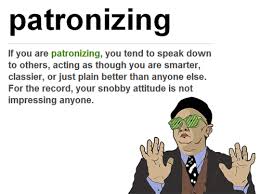patronizing
英 [ˈpæt.rə.naɪ.zɪŋ]
美 [ˈpeɪ.trə.naɪ.zɪŋ]
- adj. 要人领情的;自视高人一等的;屈尊俯就的;以恩人态度自居的
- v. 屈尊俯就(patronize的现在分词)
使用频率:

记忆方法
记忆方法:联想“patronizing”为“pa-tro-nizing”,想象一个“patron”(资助者、顾客)在“on”(在...上)表现出一副高高在上的态度,用这个夸张的图像来记住这个词意味着“贬低人的、装模作样的”。
以上内容由AI生成, 仅供参考和借鉴
英语词源
- patronizing (adj.)
- 1727, past participle adjective from patronize. Related: Patronizingly.
权威例句
- 1. It is counter-productive to address an interviewee in patronizing tones.
- 以盛气凌人的语气同面试者讲话将会适得其反。
- 2. The voice was patronizing and affected, the accent artificial.
- 声音拿腔拿调的,听上去矫揉造作。
- 3. The tone of the interview was unnecessarily patronizing.
- 面试官的口气让人觉得受了他多大恩惠似的,实在没有必要。
- 4. I was only trying to explain; I didn't want to sound patronizing.
- 我只是想解释一下而已,绝无自诩清高之意。
- 5. Burke's response seemed a little patronizing, though he undoubtedly hadn'tintended it that way.
- 伯克的回答有点施恩与人的感觉,尽管他无疑并没有那个意思。